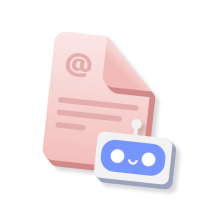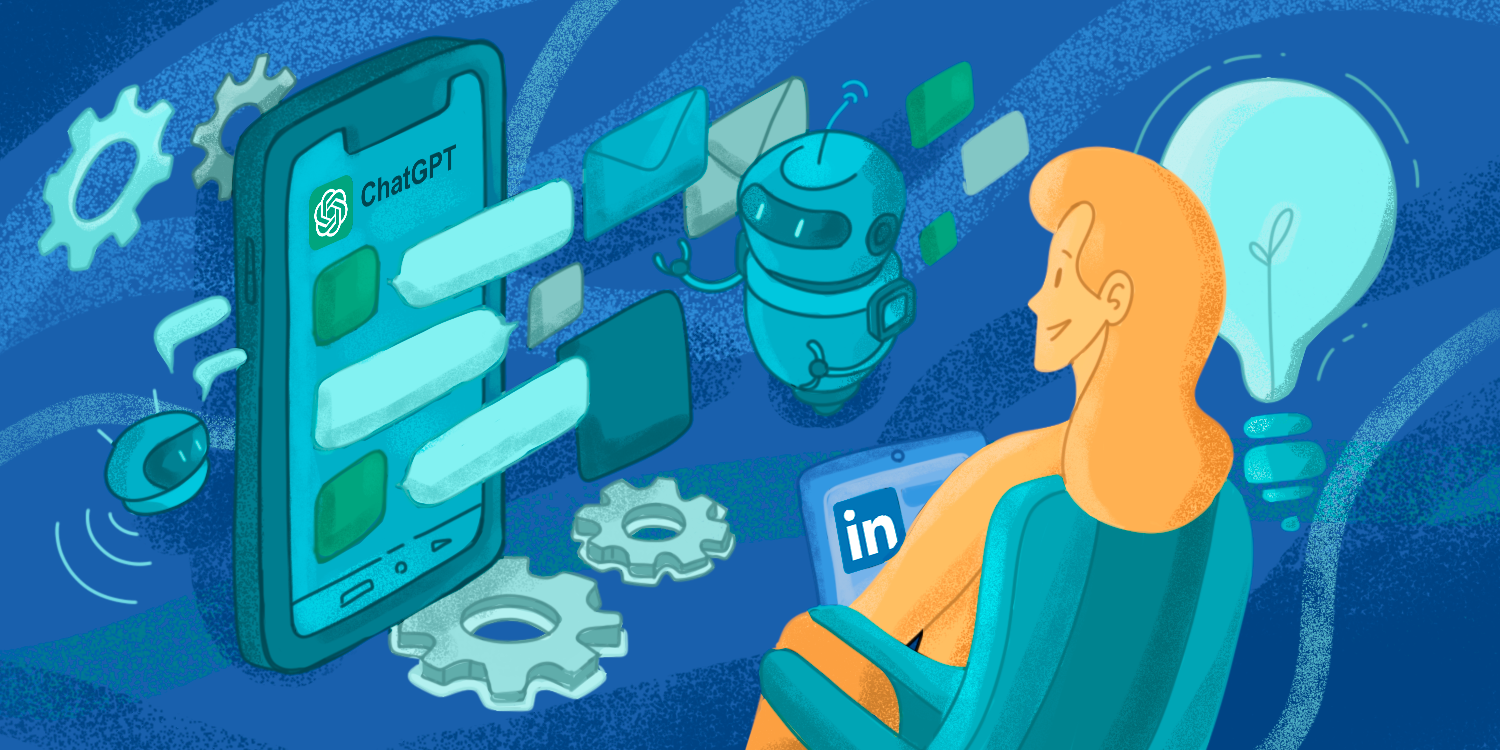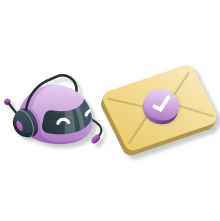Artificial intelligence. You hear about it from every corner today. AI-powered text, AI-powered images, AI-powered videos, AI-powered business. Yeah, if your company hasn’t adopted AI yet, you look like….a fool.
That’s why your competitors might have already rushed stacking AI mechanisms everywhere they can.
But what if you are a person who doesn’t want to follow market trends blindly? What if you need to think it all over before making business decisions?
You’re on the right track, my friend. In this post, I’ve tried to highlight everything you need to know about AI, its role in business, sales in particular, and how it can help you grow your sales effectiveness with no risks.
Outline:
What is AI?
AI, or Artificial Intelligence, refers to the simulation of human intelligence processes by computer systems. In particular, AI software mimics processes such as learning (acquiring information and rules for using that information), reasoning (using rules to reach approximate or definite conclusions), and self-correction.
AI combines knowledge and techniques from various domains, including computer science, machine learning, cognitive science, neuroscience, robotics, and more.
How does it look in practice?
If you’ve already tried a popular product from OpenAI, ChatGPT (if not, now’s the time), you know how: you type in any question you want to get information about, and ChatGPT instantly provides you with the answer:
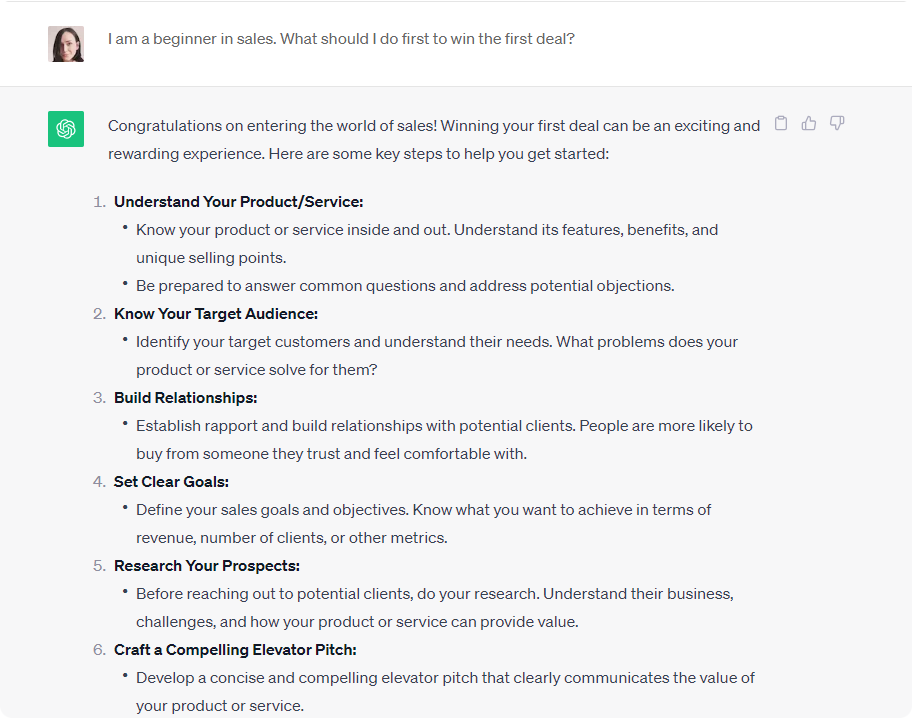
“Just like Google?” – those who haven’t ever used ChatGPT may ask.
Not exactly. Google directs you to the source of the information you’re looking for. In contrast, ChatGPT provides you with the direct information you need as though you’re consulting an I-know-it-all guru about any subject in the world.
Don’t Start Using ChatGPT For Sales Tomorrow…Do It Now
November 26 2025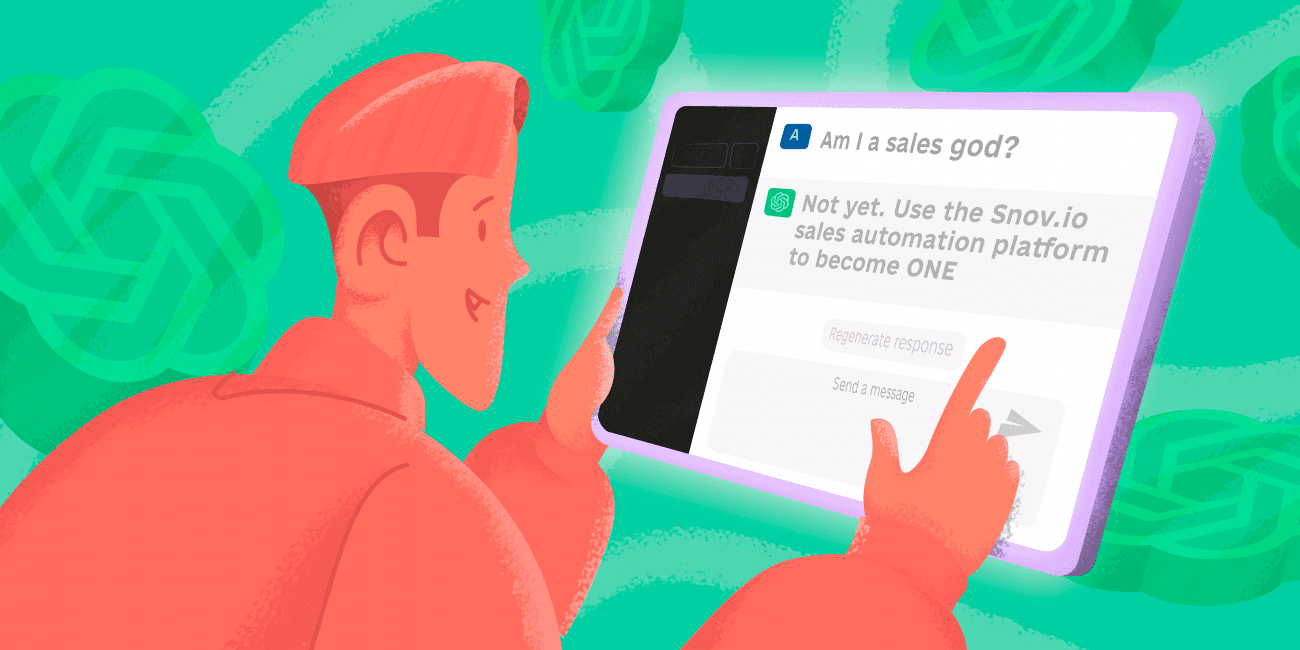
I’ve just mentioned the easiest way to use AI. In fact, the role of AI in business processes is now hard to underestimate. But why do global companies seek AI-powered solutions? Can AI guarantee quick growth and success? Let’s pay attention to numbers.
How AI is transforming business: AI statistics
In this chapter, I’ve gathered some statistics to show how companies are leveraging AI for sales and marketing, transforming their business landscape:
- Among the top user groups of AI are those in marketing and sales teams: 23% of marketing professionals and 21% of sales professionals claim they use AI in their work.
- About 33% of marketers say that AI helps them save time. Another 31% value AI for offering insights into audience preferences, and 26% of marketers appreciate how AI and machine learning help them improve and optimize their lead-gen content.
- AI also positively influences customer support productivity. Using an AI-driven conversational assistant resulted in a 14% increase in the number of issues resolved per hour.
- When it comes to sales, AI seems a real game changer. Companies that integrated AI sales technology observed a 50% surge in their lead base while reducing call times by up to 70% and overall expenses by 60%.
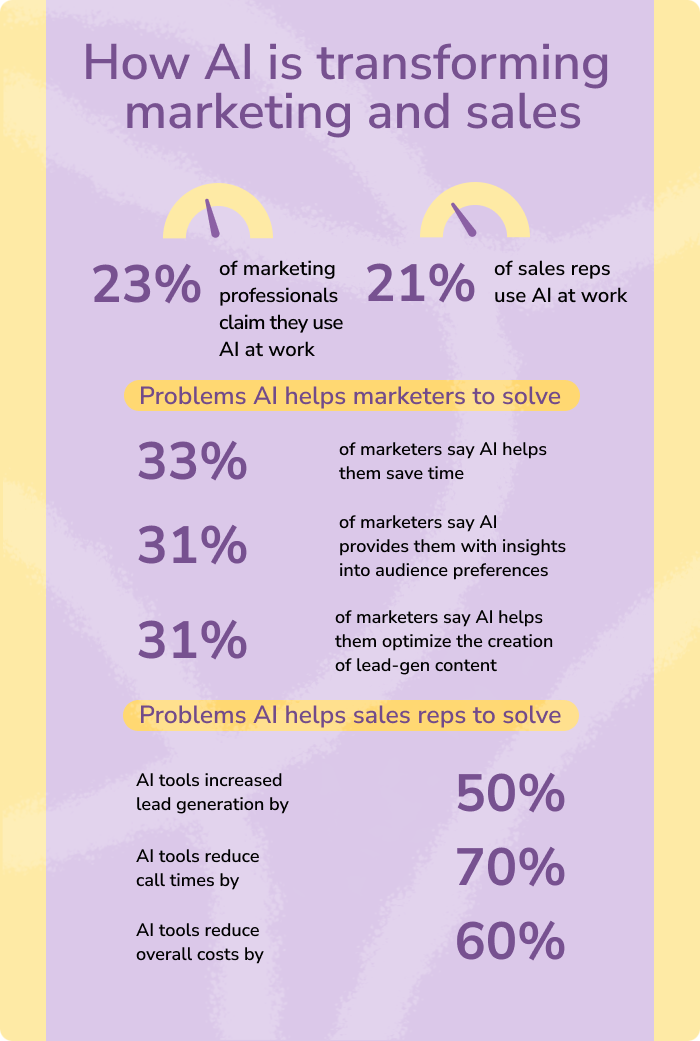
It’s noteworthy that a fifth of current sales tasks can be automated. Quite a lot, especially when your sales growth is at stake, isn’t it?
Let’s focus on the role of AI in sales to find opportunities for your business.
What is AI in sales?
AI in sales uses artificial intelligence to automate sales tasks, simplifying and optimizing sales processes. As a rule, artificial intelligence in sales boils down to utilizing AI-powered software tools.
Why you need AI for sales teams
AI in sales allows your team to work smarter and focus on activities that require human expertise, rather than repetitive tasks, which in the era of automation should be delegated to technology.
|
The rise of AI has potential for impact in three areas of marketing and sales: customer experience, growth, and productivity. |
Benefits of AI automation in sales
Automating your sales with AI and machine learning can bring you numerous advantages in the following aspects of your sales process:
- Routine tasks. AI can handle routine tasks like data entry, lead scoring, sales calls, cold emails, and email follow-up, freeing you up for higher-value activities, such as building relationships and closing deals. This boosts productivity, trims costs, and enhances sales process efficiency.
- Personalization. Artificial intelligence analyzes customer data and buyer behavior to provide recommendations for personalized sales outreach (sales calls and emails), leading to higher engagement and conversion rates.
- Lead qualification. AI-driven models can automatically pinpoint high-potential leads, ensuring your sales team prioritizes them in the right way.
- Customer experience. AI chat assistants improve the customer experience by providing quick, relevant, and round-the-clock responses, enhancing customer satisfaction.
- Sales coaching. AI offers real-time feedback and coaching to sales reps during customer interactions, helping them improve their performance and deal-closure capabilities.
- Competitive advantage. Using AI for sales, you start responding to market changes, customer needs, and emerging opportunities more quickly, which helps you stay ahead of competitors.
- Sales forecasting. AI and machine learning offer precise predictions, so every sales rep can better forecast sales, plan resources, and set more realistic targets.
As a result of adopting AI into your sales process, you revolutionize it step by step, ultimately reaching revenue growth and business success.
There are tools that can further enhance your sales and marketing strategies, such as text-to-speech software, enabling automated voice calls and personalized voice messages that add a personal touch and build stronger customer relationships by integrating seamlessly into your CRM system.
How your team can use AI in sales: opportunities and sales AI tools
In this section, let’s explore the objectives and methods sales teams can adopt AI for. I’ll share the key approaches and AI artificial intelligence tools to equip your team.
Lead generation
Use AI technologies for lead generation in both inbound and outbound strategies. For example, AI chatbots can interact with website visitors, collecting lead data in real-time. AI can also track user behaviors on websites and digital platforms, discerning their preferences and intentions. This data helps you further deliver personalized ads and relevant lead-gen content.
AI-driven lead scoring and predictive analytics help identify leads with higher conversion potential, so you prioritize them in your sales funnel.
Lead generation AI tools:
- Leadzen. This tool collects information about prospects from platforms like Google, Facebook, LinkedIn, YouTube, Twitter, and Instagram. It allows you to upload your database and get comprehensive information about prospects, offering smart search filters for specific criteria-based lookups.
- Copilot AI. This service analyzes LinkedIn interactions to filter out the most useful ones for you to reach out to LinkedIn leads.
- Drift. The tool uses bots to automatically engage with potential customers on your website and capture leads while they’re chatting with you.
Personalized outreach automation
Artificial intelligence can track user behavior on websites and digital platforms to understand their preferences and intentions. This allows you to segment your audience based on various criteria, including location, behavior, purchase history, and engagement level, and tailor your outreach to meet the specific needs of each group.
For email outreach, AI can customize email subject lines, content, and even send times, taking into account recipient behavior and past customer interactions.
Outreach automation AI tools
- Jason AI. A product by Reply.io, this tool streamlines communication with prospects across various channels. It learns about a company’s offerings to auto-respond to basic queries, manages conversations with prospects (including meeting booking), provides details about products or services, makes counter-offers, fetches relevant contacts, and can even reschedule or cancel meetings on your behalf.
- Saleshandy. This solution offers an array of AI-powered features, such as reply categorization, spam detection, and rescheduling.
And if you need an advanced solution that analyzes your ICP to create highly personalized emails based on your unique selling points, try Snov.io AI Persona-driven Email Builder.
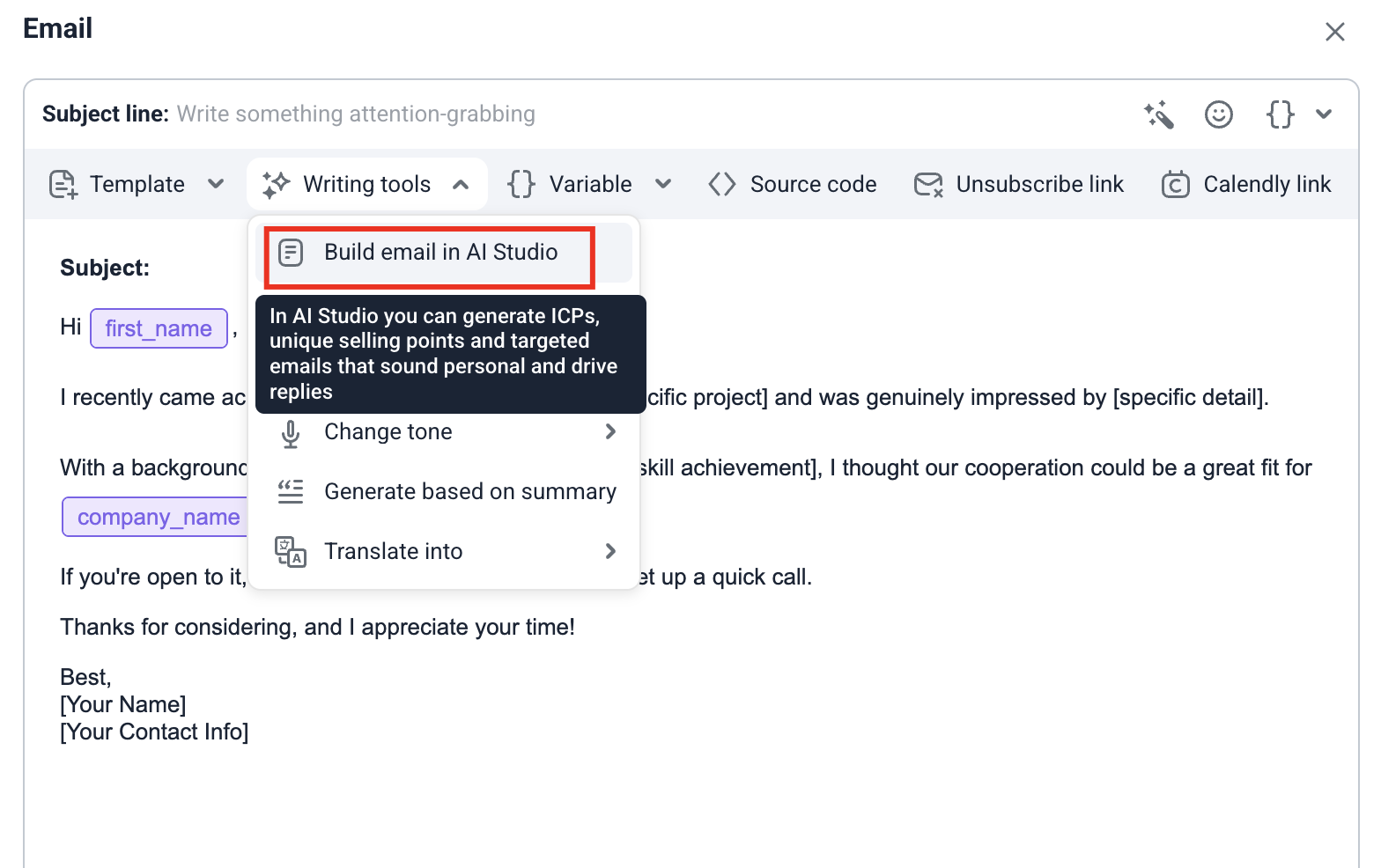
When combined with Snov.io’s variables, you’ll get hyper-personalized automated email campaigns powered by AI in no time. What’s more, you can use this AI email generator as part of an all-in-one package that includes other Snov.io tools like email campaigns, email finder and verifier, email warm-up, and a free Snov.io sales CRM.
Sales forecasting
AI-driven sales forecasting models enable you to predict future sales trends and make data-driven decisions on resource allocation, goal setting, and adapting your sales strategy in response to ongoing business changes.
Additionally, AI can perform sentiment analysis and predict future sentiment trends based on historical data and customer behavior.
Sales forecasting AI tools
- Clari. The AI-driven forecasting engine of this tool examines your current sales data and the history of your wins and loses, offering insights into your future sales performance and highlighting which opportunities might have a higher likelihood of closing.
- BoostUp.ai. This robust AI-driven forecasting solution uses predictive analytics to unveil valuable insights and patterns within data, which your team can access through Salesforce. The tool learns from historical data – like conversion rates by manager and by rep – and applies real-time deal-by-deal risk scoring.
Customer engagement and retention
AI can automate the process of sentiment analysis (how customers feel about your product or brand) from your interactions – ranging from emails and chat to sales calls, social media, and customer reviews.
If the AI detects any negative sentiment, it can send real-time alerts, allowing swift responses that prevent potential damage to your brand reputation.
What’s more, with AI technology, you can analyze accounts at risk of churning and develop the right engagement strategies to retain these customers. Finally, AI-driven recommendations can help you upsell or cross-sell products or services to existing customers, keeping them loyal to your product and brand.
AI tools for customer engagement and retention
- Hook. Hook’s AI-powered algorithms analyze customer data, purchase history, behavior patterns, and interactions to identify potential upselling and cross-selling opportunities. Your team gets actionable insights that help you create targeted campaigns and personalized offers, increasing the likelihood of additional purchases.
- Forethought AI. This AI-powered customer retention software combines a chatbot and retention insights to enhance customer support and engagement. Forethought AI’s chatbot feature provides your sales team with a smart virtual assistant that handles customer inquiries, gives personalized recommendations, and assists in issue resolution.
Sales training
Your sales representatives can significantly benefit from AI-driven sales training platforms. These platforms offer personalized coaching and feedback, pinpointing specific areas where sales specialists might enhance their skills and expertise.
For example, artificial intelligence can help you create playbooks for any sales methodology your sales team is supposed to follow. Additionally, AI can autonomously monitor how your sales reps align with the playbook guidelines and address questions listed within.
Sales training AI tools
- Quantified’s AI. This sales simulator is like a flight simulator for sellers. It evaluates over 1,400 behaviors to assess your team members’ skills in Rapport, Knowledge, and Process. You’ve got a personal AI practice partner that gives you scores for accomplishing practice tasks and provides reports on your sales performance.
- Pickle AI. Pickle AI introduces an innovative approach to sales training, transforming it into an engaging competition rather than a conventional training session. By incorporating elements of gamification, the tool encourages you to improve your skills and learn in a stress-free manner.
Feedback and reporting
You can use AI to track key performance indicators (KPIs) and sales metrics. The AI tools will provide you with reports and dashboards on your overall performance. This will help your team continuously improve their performance.
- Gong. This is one of the best tools for sales analytics powered by artificial intelligence. Gong analyzes sales interactions and tracks key metrics for your team, providing you with necessary insights into your overall sales strategy, productivity, and deals.
- Convin. This tool helps you review your sales reps’ daily activities and your sales pipeline. It easily integrates with your calendar, dialer, cloud telephony system, and video conferencing platform, along with Slack and CRM, records your conversations, analyzes them, and then highlights for you the call insights like topics discussed, queries, feedback, call performance score, soft skills, actionable items, etc.
Potential risks of AI for sales
Despite the enormous benefits your sales team can gain from implementing AI sales solutions, I can’t help but mention the risks waiting for you in the way of AI-boosted sales automation.
Inaccuracy
AI models are only as good as the data they are trained on. If the training data is incomplete, biased, or unrepresentative, you can’t count on accurate or reliable results. This may lead your team to poor decision-making.
Privacy and security
The use of AI for sales often involves gathering and processing large amounts of data. While implementing any AI solution, you should comply with regulations such as GDPR to ensure the privacy and security of customer data are in good hands.
Customer resistance
Some prospective or existing customers may feel they’re interacting with AI-driven systems. Finding no comfort in such non-human cooperation, they might become reluctant to deal with your team further.
Lack of transparency
If AI algorithms are not transparent, which is often the case, it can lead to mistrust among customers and sales teams. You should understand and be ready to explain how decisions are made by AI models.
Cost-effectiveness
Implementing and maintaining AI sales functionality may cost money, and sometimes lots of money, if you aren’t able to carefully weigh the costs against the expected benefits. It’s the moment of understanding your company goals and setting priorities.
Considering all these risks and limitations of sales AI software, let’s take a look at how you can leverage AI for your sales process smartly.
Best practices for using AI in sales
In the last chapter of the guide, let me share some recommendations on how to use artificial intelligence for sales to your best advantage.
Choose your main sales platform/CRM
Okay, you might use plenty of AI-powered tools for various goals, but will you be okay switching from tab to tab? I doubt it. You need a centralized sales automation or CRM platform that would either include all the AI features you want or integrate well with AI-powered solutions.
Furthermore, this platform must offer crystal transparency to your sales reps and foster transparency of the whole sales process.
For instance, Snov.io AI Persona-driven Email Builder, perfectly syncs with Snov.io CRM, which allows you to manage your leads in the pipeline view, never miss out on any follow-up, share every deal, notes, and prospect information with the team, whereas you’re reaching to your leads automatically with the AI-powered email at any stage of the sales cycle.
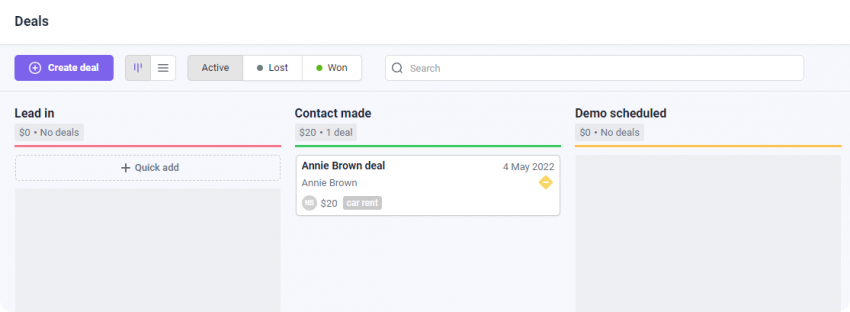
You can integrate Snov.io with other CRMs with AI sales features for automated lead enrichment and real-time data updates. That will help you reduce manual tasks and improve the overall sales process.
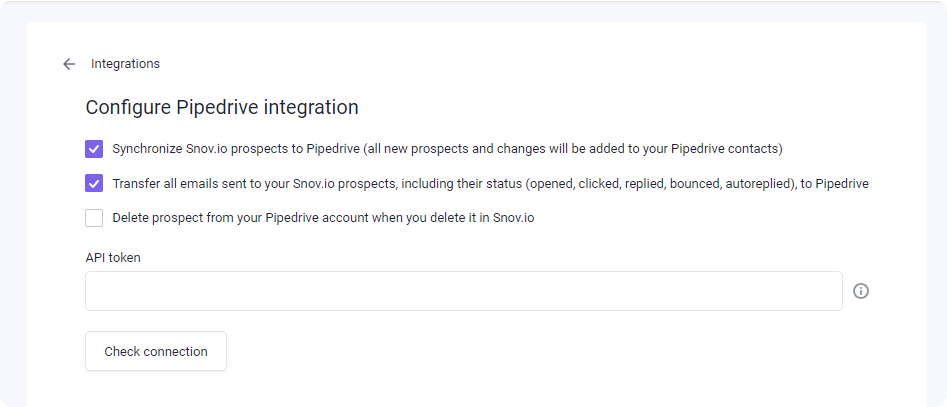
Customize AI to the specifics of your product
I know, now, you might have a feeling your team needs as many AI sales tools as possible to cover all needs. Trends are pressing sometimes. But is your sales team actually ready to adopt many tools? This might be costly and overall complicated for small businesses or startups.
If your company is a startup focused on bulk email outreach, you obviously need to use the AI email assistant to ease the process of creating mass emails, but it doesn’t mean you need to rush adopting complicated AI reporting services at the moment. Most email automation platforms offer tracking mechanisms that will monitor your email performance anyway.
What I mean is that you need to analyze your company processes and infer which AI functionality your team needs first of all. Think how you can sync it with what you already have and what should be your next goal.
Smoothly, consistently, smartly…
Remember about a human touch
No matter which sales AI tools you use, remember that automation is the product of a human brain. And now, human soft skills can’t be overrun by artificial intelligence, machine learning, NLP (natural language processing), etc.
In sales, when you need to communicate with real people, remember they are still waiting for your special attitude. AI might help you create emails, neat sales pitch templates, and sales call scripts, but your personal attitude, empathy, and emotions are unique and hence too difficult for AI algorithms to mimic.
Add a human touch to every point of contact you make.
Train your team
There are still lots of people who can’t use artificial intelligence effectively. And chances are you’ve got such people in your team. Be ready to train them on how to use sales AI technology. But first, make sure you understand it by yourself.
It’s time for you to dive deeper into how AI sales tools work, choose one for your team, try it on your own, and work out a comprehensive training program for your sales reps on how they can easily adopt AI in their everyday work.
Wrapping up
In the business world, where artificial intelligence looks like a number one trend, it looks like a crime not to apply it to your sales process. In this guide, I tried to provide you with the basics of why you need AI, what you can do with AI tools, examples of these services based on different goals, and best practices.
Now it’s your turn to try AI and share your experience with us in the comments below. And if you want to see how the Snov.io ICP based email builder magically transforms your emails into prospect-oriented outreach campaigns, don’t hesitate to try the tool today.
Snov.io likes to surprise its users 🙂

